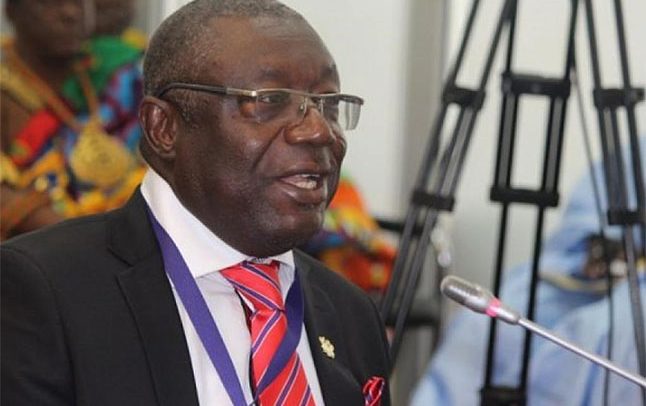Dr. Kwaku Afriyie
THE MINISTER for Environment, Science, Technology and Innovation (MESTI), Dr. Kwaku Afriyie, has inaugurated a new governing board for the Land Use and Spatial Planning Authority (LUSPA) in Accra.
The new board has on it seventeen technocrats drawn from various state institutions and agencies, with Professor Kwasi Kwafo Adarkwa as the chairman.
Other members on the board are Ebenezer Sam [Ministry of Works and Housing]; Dr. Kojo Essien Mensah-Abrampa [National Development Planning Authority]; Naa Puowele Karbo III [National House of Chiefs]; Dr. Joseph Kwaku Amaglo [Ghana Institute of Surveyors] and Kwadwo Yeboah [LUSPA].
Also on the new LUSPA board are Madam Suweibatu Adam [Ministry of Lands and Natural Resources]; Kwabena Agyei Agyepong [Ghana Institute of Engineering]; Maame Ama Edumadze-Acquah [Office of Administrator of Stool Lands]; Michael Kofi Mensah [Ghana Institute of Planners]; Surveyor Jones Ofori Boadu [Lands Commission] and Dr. Christine O. Asare [Environmental Protection Agency].
Seth Osei Akoto [Ministry for Food and Agriculture]; Phillip Lartey [Ministry of Roads and Highways]; Lydia Essuah [MESTI]; Samuel Seth Passah [Ministry of Local Government and Rural Development] and Nana Akua A.A. Oppong-Birmeh [Ghana Institute of Architects] are the rest of the members of the board.
Shortly after inaugurating them, the Minister for MESTI, Dr. Kwaku Afriyie charged the new board to give off their best in the discharge of their duties and deliver on their mandate.
He also urged them to work closely with the management of the Authority to ensure that its objectives are achieved.
On his part, Chairman for the newly inaugurated LUSPA board, Professor Kwasi Kwafo Adarkwa noted that human settlements in Ghana are challenged with unplanned and spontaneous urbanisation which has resulted in many slum dwellings with their attendant poverty, insecurity, general poor environmental conditions and poor housing as evidenced by the recent proliferation of ‘kiosk estates’ in parts of the country.
He, therefore, called on all relevant stakeholders to support the board in providing guidance through its systems and structures in ensuring orderly spatial development in the country.
“With the help of all relevant stakeholders, we will jealously guide this role by becoming increasingly more proactive and effective in planning to prevent situations such as the proliferation of kiosk estates in the capital and other major cities,” he intimated.
The Land Use and Spatial Planning Authority (LUSPA) is responsible for sustainable development of land and human settlements through a decentralised planning system while the board is responsible for providing strategic directions in ensuring that the overall objectives and functions of the Authority are achieved.
By Nii Adjei Mensahfio


